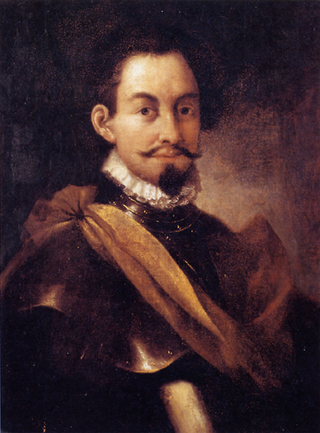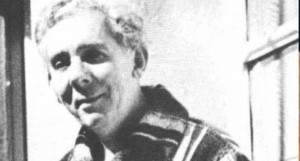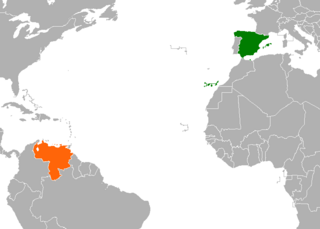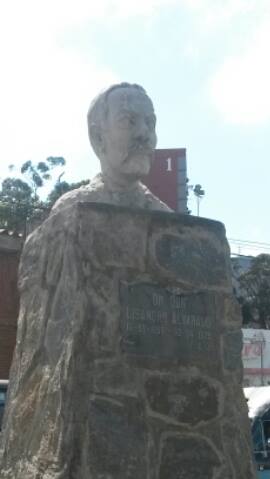
German attempts at the colonization of the Americas consisted of German Venezuela, St. Thomas and Crab Island in the 16th and 17th centuries.

Lara State is one of the 23 states of Venezuela. Lara is located in the Central-Western Region, Venezuela. The state capital is Barquisimeto.

Nikolaus Federmann was a German adventurer and conquistador in what is modern-day Venezuela and Colombia. He is a significant figure in the history of Klein-Venedig (1528–1546), the concession of Venezuela Province that Charles I of Spain granted to the Welser banking family and the foundation of Santafe de Bogotá.

Philipp von Hutten was a German adventurer and an early European explorer and conquistador of Venezuela. He is a significant figure in the history of Klein-Venedig, the concession of Venezuela Province to the Welser banking family by Charles V, Holy Roman Emperor and King of Spain.
Tocuyo de la Costa is a town located in Falcón State, Venezuela, near the beaches of Parque National Morrocoy. Located on the banks of Tocuyo River, about 4.64 miles from its mouth in the Caribbean Sea, in the Autonomous Municipality Monsignor Iturriza on the east coast of Falcón State, Venezuela, near the Cuare Wildlife Refuge and Morrocoy National Park.

Ambrosius Ehinger, also Dalfinger, Thalfinger, was a German conquistador and the first governor of the Welser concession, also known as “Little Venice” (Klein-Venedig), in northern South America, now Venezuela.

The Sistema Coriano also known as Lara-Falcón Formation, Coro region or Coriano system is one of the eight natural regions of Venezuela. Is the hilly and semi-mountainous area in northwest Venezuela, north of the Mérida Andes and east of the Maracaibo Basin, extending north to the Caribbean coast. It consists mostly of east–west running ridges, with the exception of the Sierra de Siruma or Empalado which run north–south.

Klein-Venedig or Welserland was the most significant territory of the German colonization of the Americas, from 1528 to 1546, in which the Welser banking and patrician family of the Free Imperial Cities of Augsburg and Nuremberg obtained colonial rights in the Province of Venezuela in return for debts owed by the Holy Roman Emperor Charles V, who was also King of Spain. In 1528, Charles V issued a charter by which the House of Welser possessed the rights to explore, rule and colonize the area, also with the motivation of searching for the legendary golden city of El Dorado. The venture was led at first by Ambrosius Ehinger, who founded Maracaibo in 1529. After the deaths of Ehinger (1533) and then his successor Georg von Speyer (1540), Philipp von Hutten continued exploration in the interior, and in his absence from the capital of the province the crown of Spain claimed the right to appoint the governor. On Hutten's return to the capital, Santa Ana de Coro, in 1546, the Spanish governor Juan de Carvajal had von Hutten and Bartholomeus VI. Welser executed. King Charles V revoked Welser's charter.
Italian Venezuelans are Venezuelan citizens of Italian descent. The word may refer to someone born in Venezuela of Italian descent or to someone who has emigrated to Venezuela from Italy. Italians were among the largest groups of European immigrants to settle in the country. Approximately 5 million Venezuelans have some degree of Italian ancestry.

José Gil Fortoul was a Venezuelan writer, historian, and politician, who was briefly the acting president of Venezuela. As a political scientist and legal scholar, he is closely identified with the movement of Venezuelan positivism. He was an ally of the dictator Juan Vicente Gómez, supporting his regime both politically and in his social and historical writing. In 1913 Fortoul was appointed provisional President of Venezuela, serving for less than a year.

Juan de Carvajal was a Spanish conquistador and one of the first governors of Venezuela Province.

The Venezuela Province was a province of the Spanish Empire, of Gran Colombia (1824-1830) and later of Venezuela, apart from an interlude when it was contracted as a concession by the King of Spain to the German Welser banking family, as Klein-Venedig.

Julio Garmendia (1898–1977) was a Venezuelan writer, journalist and diplomat.
German Venezuelans are Venezuelan citizens who descend from Germans or German people with Venezuelan citizenship. Most of them live in Caracas, Maracaibo, Valencia, Colonia agrícola de Turén, El Jarillo, and Colonia Tovar where a small-reduced and decreasing minority of people speak the Colonia Tovar dialect, a German-derived dialect from their ancestry, and the Spanish language.
Spanish expeditions led by Columbus and Alonso de Ojeda reached the coast of present-day Venezuela in 1498 and 1499. The first colonial exploitation was of the pearl oysters of the "Pearl Islands". Spain established its first permanent South American settlement in the present-day city of Cumaná in 1502, and in 1577 Caracas became the capital of the Province of Venezuela. There was also for a few years a German colony at Klein-Venedig.

Spain–Venezuelan relations are the bilateral relations between the Kingdom of Spain and the Bolivarian Republic of Venezuela. Both nations are members of the Association of Spanish Language Academies and the Organization of Ibero-American States.

The Guayupe are an Arawak-speaking indigenous group of people in modern-day Colombia. They inhabit the westernmost parts of the department of Meta. At the time of the Spanish conquest, more than 250,000 Guayupe were living in large parts of Meta.
Basque Venezuelans are citizens of Venezuela who are of Basque ancestry.

Lisandro Alvarado was a Venezuelan doctor, naturalist, historian, ethnologist and linguist.

The Coro Revolution, also known as the Colinada Revolution, was an armed insurrection commanded by General León Colina that occurred in Venezuela between October 1874 and February 1875 against the government of Antonio Guzmán Blanco. The conflict was one of the main armed movements against the dictatorship of Antonio Guzmán Blanco.














